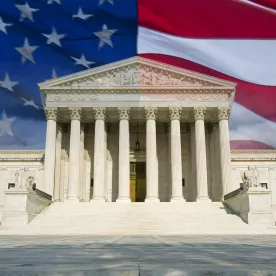On November 12, 2019, the Supreme Court of the United States heard oral argument on the legality of the Department of Homeland Security’s (DHS) decision to terminate Deferred Action for Childhood Arrivals (DACA), an Obama-era program that provides work authorization and protection from deportation to young undocumented immigrants who were brought to the United States as children. The roughly 80-minute session focused on two primary questions: whether the Court had the authority to review DHS’s decision to end DACA and, if so, whether the decision was legal.
Termination of DACA and Judicial Review
The government, represented by U.S. Solicitor General Noel J. Francisco, argued that the decision to end DACA fell squarely within DHS’s enforcement power or, more specifically, its power to end a policy of nonenforcement. He said that by moving to end DACA, an interim program, DHS had moved back toward Congressional intent. He used the example of a prosecutor who decides not to enforce the death penalty because he or she does not believe in it. He said that such a decision would be legal, just as it would be for a subsequent prosecutor to return to seeking the death penalty.
Theodore B. Olson, the attorney representing DACA recipients in three consolidated cases from New York, California, and the District of Columbia, responded to the question of judicial review by saying that it was not an ordinary question about prosecutorial discretion. In the case of DACA, he argued, the government had invited a specific population to participate in a program that had conferred benefits and created reliance.
While all parties seemed to agree that it was within DHS’s authority to put an end to DACA, there was a significant amount of debate about how the agency had chosen to do so. Attorneys for DACA argued that the administration’s termination of the program had been clumsy and abrupt and that the government had not provided a clear rational for the policy change. Francisco, on the other hand, said that the government had provided valid legal and policy reasons for ending DACA.
Potential Consequences of Ending DACA
Several justices asked whether DHS had adequately weighed the “reliance interests” associated with ending DACA, including the impact not only on DACA recipients, but also on employers, communities, and the economy as a whole. Francisco argued that DACA recipients had had no right to rely on the program, given its temporary nature.
A few of the justices weighed the option of remanding the case for reconsideration by DHS, an idea supported by the attorneys who argued in favor of the program. The attorneys questioned whether the administration might take a different approach if it had to “own” its decision to end DACA (instead of saying the policy was illegal, as was the case in DHS’s initial memo announcing the termination of the program). A number of justices questioned what difference it would make to send the case back when the government had already made clear that it was determined to terminate the program, if not now, then later.
DACA, which was implemented by President Barack Obama in 2012, provides work authorization and protection from deportation to approximately 700,000 qualifying individuals, known as Dreamers, who were brought to the United States as children. The Trump administration moved to rescind DACA in 2017, resulting in the issuance of multiple nationwide injunctions blocking DHS from putting an end to the program. Three federal courts ruled against the rescission of DACA, leaving the Trump administration to appeal to the Supreme Court for a final decision on the issue.
Moving Forward
The Supreme Court is not expected to issue an opinion before summer 2020, and it is unlikely that Congress will make any changes to DACA between now and then. For now, DACA beneficiaries with valid employment authorization documents (EADs) may continue working. Applications for renewal of EADS can be submitted as early as 150 days before the expiration of the EADs.




 />i
/>i

